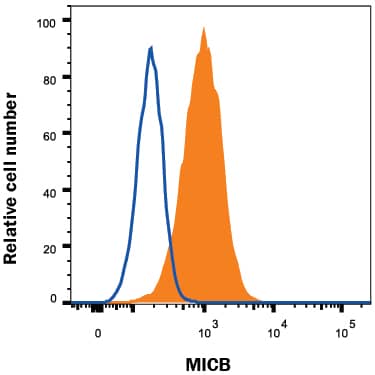Human MICB APC-conjugated Antibody
R&D Systems, part of Bio-Techne | Catalog # FAB1599A


Key Product Details
Species Reactivity
Validated:
Cited:
Applications
Validated:
Cited:
Label
Antibody Source
Product Specifications
Immunogen
Ala23-Gly298
Accession # CAI18747
Specificity
Clonality
Host
Isotype
Scientific Data Images for Human MICB APC-conjugated Antibody
Detection of MICB in K562 Human Cell Line by Flow Cytometry.
K562 human chronic myelogenous leukemia cell line was stained with Mouse Anti-Human MICB APC-conjugated Monoclonal Antibody (Catalog # FAB1599A, filled histogram) or isotype control antibody (Catalog # IC0041A, open histogram). View our protocol for Staining Membrane-associated Proteins.Applications for Human MICB APC-conjugated Antibody
Flow Cytometry
Sample: K562 human chronic myelogenous leukemia cell line
Formulation, Preparation, and Storage
Purification
Formulation
Shipping
Stability & Storage
- 12 months from date of receipt, 2 to 8 °C as supplied.
Background: MICB
MICB (MHC class I chain-related gene B) is a transmembrane glycoprotein that functions as a ligand for NKG2D. A closely related protein, MICA, shares 85% amino acid identity with MICB. These 2 proteins are distantly related to the MHC class I proteins. MICA and MICB (MICA/B) possess three extracellular immunoglobulin-like domains, but have no capacity to bind peptide or interact with beta2-microglobulin. The genes encoding MICA/B are found within the major histocompatibility complex on human chromosome 6. The MICB locus is polymorphic with more than 15 recognized human alleles. MICA/B are minimally expressed on normal cells, but are frequently expressed on epithelial tumors and can be induced by bacterial and viral infections. MICA/B are ligands for NKG2D, an activating receptor expressed on NK cells, NKT cells, gamma delta T cells, and CD8+ alpha beta T cells. Recognition of MICA/B by NKG2D results in the activation of cytolytic activity and/or cytokine production by these effector cells. MICA/B recognition is involved in tumor surveillance, viral infections, and autoimmune diseases. The release of soluble forms of MICA/B from tumors down-regulates NKG2D surface expression on effector cells resulting in the impairment of anti-tumor immune response (1-7).
References
- Groh, V. et al. (2001) Nature Immunol. 2:255.
- Stephens, H. (2001) Trends Immunol. 22:378.
- Bauer, S. et al. (1999) Science 285:727.
- Groh, V. et al. (2002) Nature 419:734.
- Steinle, A. et al. (2001) Immunogenetics 53:279.
- Pende, D. et al. (2002) Cancer Res. 62:6178.
- Salih, H. et al. (2003) Blood 102:1389.
Long Name
Alternate Names
Entrez Gene IDs
Gene Symbol
UniProt
Additional MICB Products
Product Documents for Human MICB APC-conjugated Antibody
Product Specific Notices for Human MICB APC-conjugated Antibody
For research use only